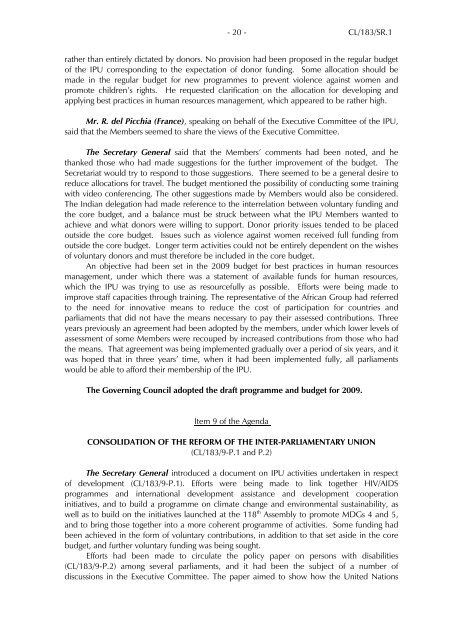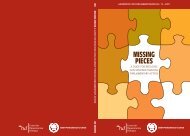CASE No - Inter-Parliamentary Union
CASE No - Inter-Parliamentary Union
CASE No - Inter-Parliamentary Union
You also want an ePaper? Increase the reach of your titles
YUMPU automatically turns print PDFs into web optimized ePapers that Google loves.
- 20 - CL/183/SR.1<br />
rather than entirely dictated by donors. <strong>No</strong> provision had been proposed in the regular budget<br />
of the IPU corresponding to the expectation of donor funding. Some allocation should be<br />
made in the regular budget for new programmes to prevent violence against women and<br />
promote children’s rights. He requested clarification on the allocation for developing and<br />
applying best practices in human resources management, which appeared to be rather high.<br />
Mr. R. del Picchia (France), speaking on behalf of the Executive Committee of the IPU,<br />
said that the Members seemed to share the views of the Executive Committee.<br />
The Secretary General said that the Members’ comments had been noted, and he<br />
thanked those who had made suggestions for the further improvement of the budget. The<br />
Secretariat would try to respond to those suggestions. There seemed to be a general desire to<br />
reduce allocations for travel. The budget mentioned the possibility of conducting some training<br />
with video conferencing. The other suggestions made by Members would also be considered.<br />
The Indian delegation had made reference to the interrelation between voluntary funding and<br />
the core budget, and a balance must be struck between what the IPU Members wanted to<br />
achieve and what donors were willing to support. Donor priority issues tended to be placed<br />
outside the core budget. Issues such as violence against women received full funding from<br />
outside the core budget. Longer term activities could not be entirely dependent on the wishes<br />
of voluntary donors and must therefore be included in the core budget.<br />
An objective had been set in the 2009 budget for best practices in human resources<br />
management, under which there was a statement of available funds for human resources,<br />
which the IPU was trying to use as resourcefully as possible. Efforts were being made to<br />
improve staff capacities through training. The representative of the African Group had referred<br />
to the need for innovative means to reduce the cost of participation for countries and<br />
parliaments that did not have the means necessary to pay their assessed contributions. Three<br />
years previously an agreement had been adopted by the members, under which lower levels of<br />
assessment of some Members were recouped by increased contributions from those who had<br />
the means. That agreement was being implemented gradually over a period of six years, and it<br />
was hoped that in three years’ time, when it had been implemented fully, all parliaments<br />
would be able to afford their membership of the IPU.<br />
The Governing Council adopted the draft programme and budget for 2009.<br />
Item 9 of the Agenda<br />
CONSOLIDATION OF THE REFORM OF THE INTER-PARLIAMENTARY UNION<br />
(CL/183/9-P.1 and P.2)<br />
The Secretary General introduced a document on IPU activities undertaken in respect<br />
of development (CL/183/9-P.1). Efforts were being made to link together HIV/AIDS<br />
programmes and international development assistance and development cooperation<br />
initiatives, and to build a programme on climate change and environmental sustainability, as<br />
well as to build on the initiatives launched at the 118 th Assembly to promote MDGs 4 and 5,<br />
and to bring those together into a more coherent programme of activities. Some funding had<br />
been achieved in the form of voluntary contributions, in addition to that set aside in the core<br />
budget, and further voluntary funding was being sought.<br />
Efforts had been made to circulate the policy paper on persons with disabilities<br />
(CL/183/9-P.2) among several parliaments, and it had been the subject of a number of<br />
discussions in the Executive Committee. The paper aimed to show how the United Nations
















